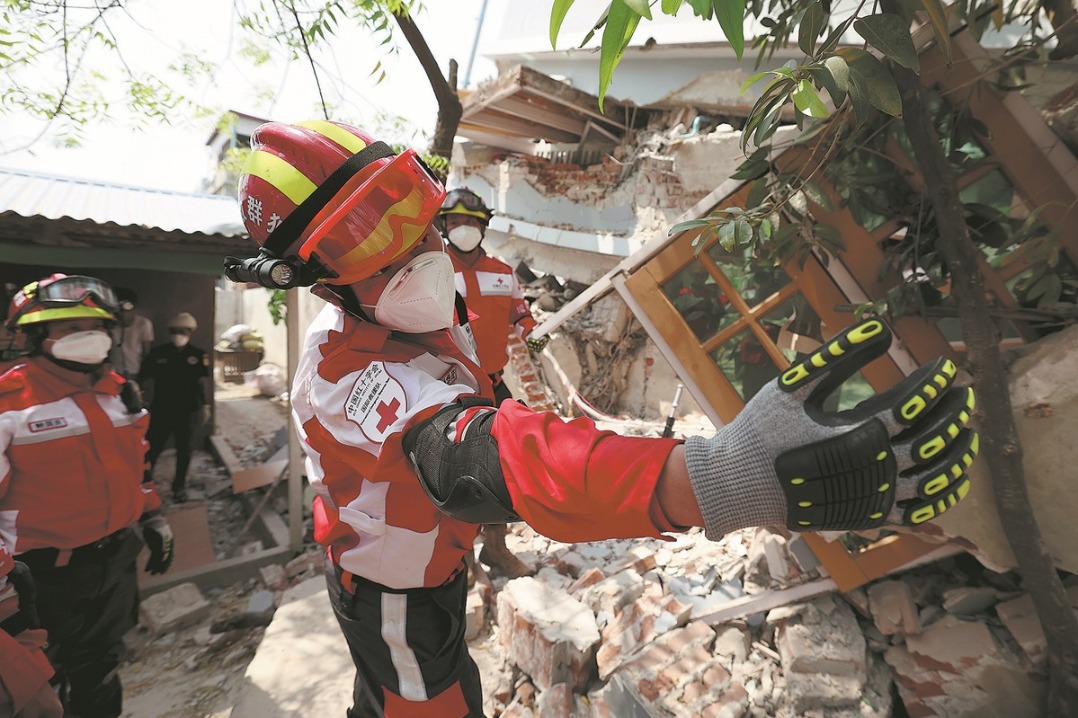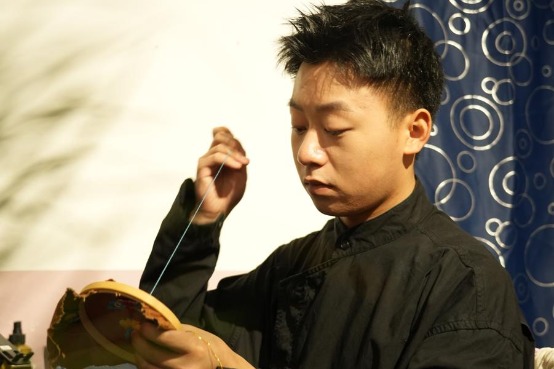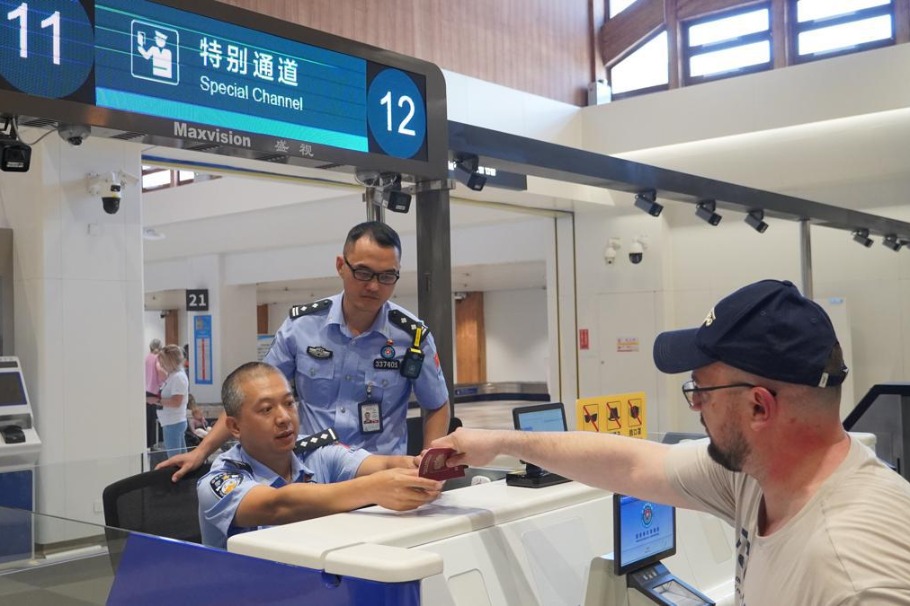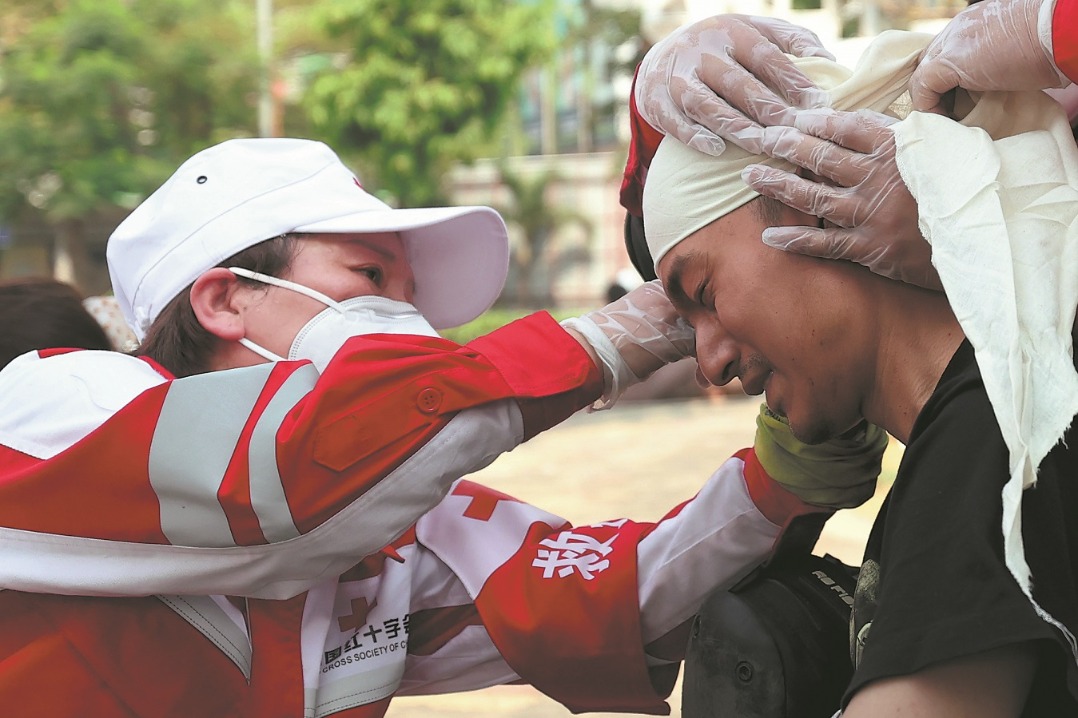Pace 'bunnies' hop to it to give runners extra bounce

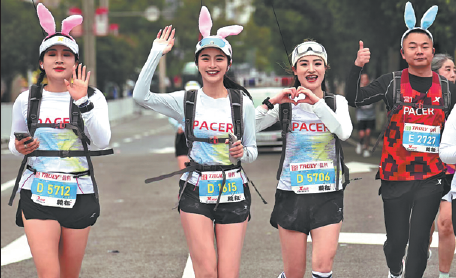
As marathons gain popularity in leaps and bounds across China, a special group of runners, known as "bunnies" or "pacers", are becoming popular among participants. Unlike regular runners, these pacers stand out with their distinct uniforms, bunny ear headbands and a flag or balloon on their backs displaying target finish times.
These "running metronomes "serve as a marathon's rhythm keepers, helping participants maintain a desired pace throughout the 42.195-kilometer course and increase their chances of completing successfully.
There are different groups of pacers in a marathon, with varying target finish times. For example, runners who follow the "4:30 pacer group" would expect to complete the race in approximately 4 hours and 30 minutes.
"Organizers of marathon events typically select experienced athletes as pacers. They must have completed at least three marathons before and have a finish time at least 15 minutes faster than the pace they are guiding," Pan Quan, who has been selected twice as "sweeper rabbit" for those aiming to finish within the official cutoff time for two marathons, told China Daily.
"Pacers are typically seasoned marathon runners, with personal bests much faster than the group target time. Therefore, the most challenging part of being a pacer is slowing down," Wang Chaoyang, a national senior marathon coach at Shanghai University of Sport, was quoted as saying by Xinmin Evening News.
"Maintaining a slower pace to guide others requires exceptional speed control skills," Wang said.
A head coach of pacers for marathons, Wang requires his trainees to keep a close eye on their watch and speed markers along the way to ensure that their pace doesn't vary by more than 3 seconds per km and that the total time deviation for the entire race is kept within 5 seconds.
Apart from excellent pacing skills and the ability to adjust on the fly, pacers also need to motivate participants, using verbal and nonverbal cues to boost their morale and resilience, Pan said.
The price of being a pacer is that they are not able to break their personal bests, but competition for these roles remains fierce, with the possibility of being selected running at about 5 percent. "While achieving a personal best is important, being able to encourage and assist other runners along the course, and seeing them push through and achieve their goals because of my support, is incredibly rewarding," Pan said.
As the popularity of marathons increases, the demand for "private bunnies", or self-hired pacers, is on the rise. The private bunnies, who can also be friends, coaches, or fellow runners, offer personalized pacing tailored to a runner's physical condition and individual needs.
Cui Ruofei, a seasoned marathon runner with five years' experience in private pacing, told media outlet Phoenix Weekly that private bunnies provide targeted assistance by assessing a runner's physical condition and training performance before a race.
During the race, they accompany and encourage their "boss", manage pacing, deliver supplies and even record videos.
They often run one to two strides ahead to shield their runner from the wind. At turns, they guide runners along the shortest path.
The fee for hiring a private pacer varies depending on the time goal set by the client, ranging from 2,000(about $275) to 6,000 yuan.
"It's normal for private pacers to charge for their services, as long as it complies with relevant regulations and laws," Cui said.
With the development of marathon culture and the increase in professional runners, private bunnies are likely to become more commonplace, the 34-year-old pacer added.
However, a clear boundary should be drawn as to how much a private rabbit can assist. Cui cited an incident where a top runner in the Nanjing Marathon was disqualified after being caught receiving a push from a private rabbit in the final stages.
Similarly, there was controversy after the 2024 Beijing Half Marathon after Chinese runner He Jie won the race thanks to three of his pace runners letting him cross the line first.
"The runner must complete the race independently," Cui said. "Physical assistance shouldn't be part of the race, and for safety reasons, it's not advisable too — if a runner needs to be pushed, they're likely exhausted, and pushing could cause safety problems."
In addition, some runners have reported encountering "rogue bunnies" who lack professionalism and responsibility. A marathon runner from Beijing shared on social media platform Xiaohongshu his recent experience at the Jiujiang Marathon in Jiangxi province, where he failed to obtain his target finish time as the pacer he followed ran four minutes faster than the intended speed, throwing off his entire race strategy.
"This is a serious issue," he wrote. "Runners aiming to finish within 3 hours and 30 minutes rely on 330 pacers for a steady pace to ensure consistent performance. If their pace is too fast in the first half, even slowing down later won't help; the runner is likely to crash mid-race."
Zhao Fuming, president of the Beijing Marathon Association, told Cover News that the quality of official pacers is crucial to the marathon event's brand image and participants' experience. Investing in and developing a strong pacer team is essential for enhancing the quality of marathons.
xunuo@chinadaily.com.cn
- Pace 'bunnies' hop to it to give runners extra bounce
- Chinese vice-premier calls for enhanced regulation of food safety, market order
- Xinjiang expands sports infrastructure with 88,800 venues by 2024
- China boosts employment, social welfare for people with disabilities
- China unveils roadmap to boost evolution into IP powerhouse
- Everlasting friendship


















